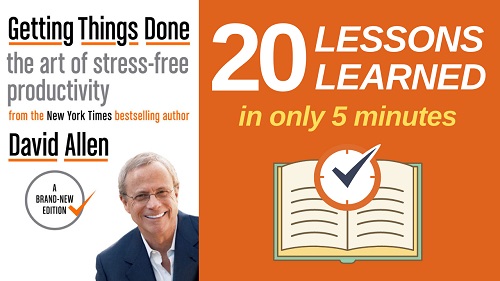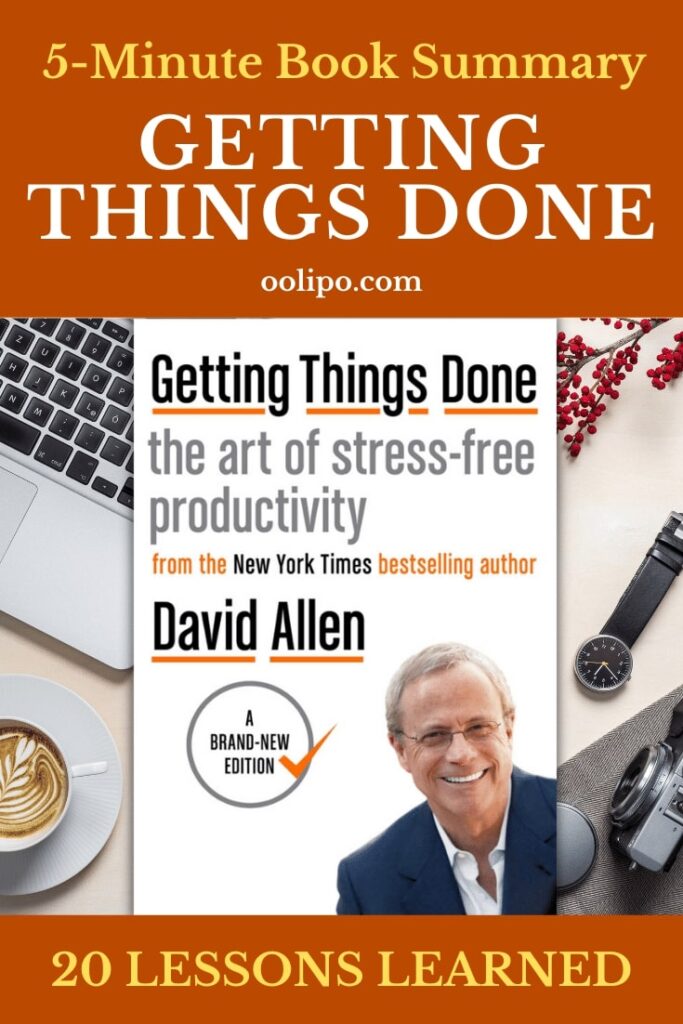Getting Things Done is a 2001 book written by David Allen. It’s a self-help book that defines how to increase your productivity, clear your mind, and manage different tasks effectively.

Getting Things Done Summary
Here are 20 lessons learned in Getting Things Done:
#1 Live and work efficiently
You have to capture all the things that need to be done and make powerful decisions to implement in your life that will help you live and work effectively.
#2 Commitments
Manage your commitments by implementing some basic activities and behaviors. This means clearing your mind and reminding yourself of the unfinished work that you have to do. After clearing your mind, you must clarify and decide what you have to do to manage your commitments. Then, take action and remind yourself of the daily commitments that you have to manage.
#3 Things on your mind
Things are on your mind because you want them to be different than they are currently. Most of the time, we can’t forget something or let go of a thought from our minds. This is because we don’t know possible outcomes or we haven’t decided what is the next step. Another reason is that we don’t know what action to take to get rid of this thought. These thoughts will stress you out until you find a solution to get rid of them.
#4 Transform
We need to transform all the “stuff” we are trying to organize into actionable items we need to do. To go into the organizational mode, one needs to gather everything that requires thinking about and then do that thinking if their organizational efforts are to be successful. Thinking first and then taking actionable steps will organize all your unresolved matters and stuff.
#5 The prime challenge
Managing actions is the prime challenge because it is difficult when you don’t know your commitments. We have many things to do but don’t know what they are. The real problem is not that we lack time, but it’s our lack of understanding, clarity about the actions and commitments.
#6 Right things at the right time
You increase your productivity and creativity exponentially when you think about the right things at the right time. Having the tools to capture your value-added thinking also contributes to productivity. Thinking consciously about any project or thing will help you come up with many other ideas and solutions to carry out a task. Concentrating fully on one thing constantly or paying attention to little details produces real progress on real things in your life.
#7 Write everything down
It’s a natural thing that our brain will sometimes forget the easiest and most important things in our life. Therefore, it’s better that we make a list of the to-do things. This will help us to remind of the things and projects that need to be done on time.
#8 Capture all the important things
This means writing down your important things, thoughts, or projects on a paper, digital note, or on an object. This will remind you always at the right time about the tasks to be done.
#9 Categories of to-do items
Use a calendar and make different categories of the to-do items to take action. David recommends that apart from making a physical to-do list we must write our daily tasks in a calendar. This will not only help us get organized but will remind us daily and from time to time of our future projects. Making different categories of lists like to call, to buy, to work on, to do errands will help everything stay at its place and will not confuse us.
#10 Track your progress
Write a project list and track your progress. Take out some time and make a list of all your to-do or current projects and from time to time to check your progress. Check if you are going on the right way or making amazing progress enough. Checking your project list will also help you see the outcomes of it.
#11 Future to-do list
Create a future to-do list or someday list. If you want to get a task done in the near future but you think that this is not the right time for you to do it, then you can make another list that contains your future to do projects. You can make different folders or lists of each month or year that will be easier for you to follow and track progress.
#12 Weekly progress
To track your progress, you must review it constantly. Taking out sometime in a week is the best practice to understand and update your list and project to-do list. Reflect on your priorities weekly and look through all of your lists to make sure that you are on the right track.
#13 Two-minute rule
If a task can be done in 2 minutes, then do it now instead of delaying it. Most of our tasks take only 2 minutes to complete. For example, making a phone call, replying to a text or email, or organizing your thoughts. Determine what your next action is. Then you will easily complete any task in 2 minutes.
#14 Environment
Don’t let your environment control you. We are constantly overburdened with phone calls, emails, and texts. These little things sometimes put pressure on us and make us feel burdened. We overreact in such situations. It is important to take hold of your emotions and control your projects, your actions, and your current struggles.
#15 What may go wrong
Make a list and write what may go wrong. When you make a to-do list or create an action plan, write down every single thing that you think may go wrong. When you think of any potential problems arising, your brain will find solutions in advance to the problems if they occur in the future. Also, you will find any mistakes in your action plan that you can correct at the right time before starting to work on them. You will know what mistakes you are making.
#16 Daily tasks
Control your day-to-day tasks first. When you start solving and working on your daily simple or short tasks, you will be less stressed and be more productive. It’s better to work and complete your daily tasks first rather than working on bigger tasks. You will succeed and be focused on bigger tasks only when you have little things to do and your mind is clear. In that case, you will know which direction you should go. Clearing your mind of daily stress and tasks will help you think more clearly to focus on the bigger picture.
#17 Rewarding
Reward yourself when you complete any tasks or projects. Rewarding yourself will encourage you and increase your confidence. Even celebrating small accomplishments will increase your self-esteem.
#18 Promises
Manage your commitments appropriately. Most of the time, we commit too many tasks at the same time which can be done step by step. Thinking about what needs to be done first and determining what is more important is an effective way to manage your commitments appropriately.
#19 Think before taking action
Think about your work before you do. We haven’t been taught how to think about our work and find solutions to do it effectively. Instead, we wake up each morning and start doing the work without even thinking about how it needs to be done or what will be its outcome. Thinking before doing anything increases your productivity and concentration.
#20 Ask why
Find the purpose of your tasks by asking yourself why? We won’t be ready to start a task or work diligently if we don’t know the reason why we are doing it and the possible outcome we will get after completing it. Asking the question “why” before starting any project or action will declutter your mind and thoughts which will result in productivity increase.
Top 10 Quotes from Getting Things Done
- The secret of getting ahead is getting started. The secret of getting started is breaking your complex overwhelming tasks into small, manageable tasks, and then starting on the first one
- You want to be adding value as you think about projects and people, not simply reminding yourself they exist
- You’ve got to think about the big things while you’re doing small things so that all the small things go in the right direction
- When enough of the right action steps have been taken, some situation will have been created that matches your initial picture of the outcome closely enough that you can call it “done.”
- Most people feel best about their work the week before their vacation, but it’s not because of the vacation itself. What do you do the last week before you leave on a big trip? You clean up, close up, clarify, and renegotiate all your agreements with yourself and others. I just suggest that you do this weekly instead of yearly
- You can fool everyone else, but you can’t fool your own mind
- Every now and then go away and have a little relaxation. To remain constantly at work will diminish your judgment. Go some distance away, because work will be in perspective and a lack of harmony is more readily seen
- Things rarely get stuck because of lack of time. They get stuck because the doing of them has not been defined
- Anything that causes you to overreact or underreact can control you, and often does
- Reacting is automatic, but thinking is not
Free PDF Download of Getting Things Done Summary to Save or Print
We created a PDF file with the summary and quotes on this page for easy access: Download Getting Things Done PDF Summary. If you want to buy the paperback version of the book, check out this page.
David Allen’s 10 Rules for Success
The Famous David Allen Ted Talk
Please share these important lessons by pinning this post to Pinterest.
